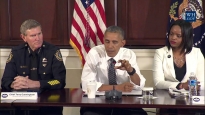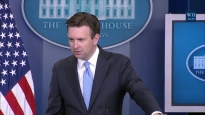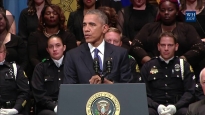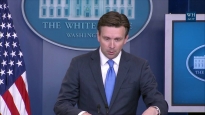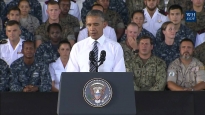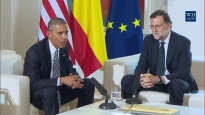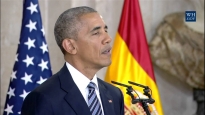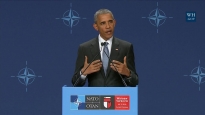President Obama’s Press Conference on the G20 Summit
November 04, 2011 | 23:58 | Public Domain
President Obama speaks to the press about the world economy and progress made at the G20 Summit.
Press Conference by President Obama After G20 Summit
Press Center
Claude Debussy Theater
Cannes, France
3:40 P.M. CET
PRESIDENT OBAMA: Good afternoon, everybody. I want to begin by thanking my friend, President Sarkozy, for his leadership and his hospitality. And I want to thank the people of Cannes for this extraordinary setting.
Over the past two years, those of us in the G20 have worked together to rescue the global economy, to avert another depression, and to put us on the path to recovery. But we came to Cannes with no illusions. The recovery has been fragile. And since our last meeting in Seoul we’ve experienced a number of new shocks -- disruptions in oil supplies, the tragic tsunami in Japan, and the financial crisis in Europe.
As a result, advanced economies, including the United States are growing and creating jobs, but not nearly fast enough. Emerging economies have started to slow. Global demand is weakening. Around the world, hundreds of millions of people are unemployed, or underemployed. Put simply, the world faces challenges that put our economic recovery at risk.
So the central question coming into Cannes was this: Could the world’s largest economies confront this challenge squarely -- understanding that these problems will not be solved overnight, could we make progress? After two days of very substantive discussions I can say that we’ve come together and made important progress to put our economic recoveries on a firmer footing.
With respect to Europe, we came to Cannes to discuss with our European friends how they will move forward and build upon the plan they agreed to last week to resolve this crisis. Events in Greece over the past 24 hours have underscored the importance of implementing the plan, fully and as quickly as possible.
Having heard from our European partners over the past two days, I am confidence that Europe has the capacity to meet this challenge. I know it isn’t easy, but what is absolutely critical, and what the world looks for in moments such as this, is action.
That’s how we confronted our financial crisis in the United States -- having our banks submit to stress tests that were rigorous, increasing capital buffers, and passing the strongest financial reforms since the Great Depression. None of that was easy, and it certainly wasn’t always popular. But we did what was necessary to address the crisis, put ourselves on a stronger footing, and help rescue the global economy.
And that’s the challenge that Europe now faces. Make no mistake, there's more hard work ahead and more difficult choices to make. But our European partners have laid a foundation on which to build, and it has all the elements needed for success: a credible firewall to prevent the crisis from spreading, strengthening European banks, charting a sustainable path for Greece, and confronting the structural issues that are at the heart of the current crisis.
And here in Cannes we’ve moved the ball forward. Europe remains on track to implement a sustainable path for Greece. Italy has agreed to a monitoring program with the IMF -- in fact, invited it. Tools have been identified that will better enable the world to support European action. And European finance ministers will carry this work forward next week.
All of us have an enormous interest in Europe's success, and all of us will be affected if Europe is not growing -- and that certainly includes the United States, which counts Europe as our largest trading partner. If Europe isn't growing, it's harder for us to do what we need to do for the American people: creating jobs, lifting up the middle class, and putting our fiscal house in order. And that's why I've made it clear that the United States will continue to do our part to support our European partners as they work to resolve this crisis.
More broadly, we agreed to stay focused on jobs and growth with an action plan in which each nation does its part. In the United States, we recognize, as the world's largest economy, the most important thing we can do for global growth is to get our own economy growing faster. Back home, we're fighting for the American Jobs Act, which will put people back to work, even as we meet our responsibilities to reduce our deficit in the coming years.
We also made progress here in Cannes on our rebalancing agenda. In an important step forward, countries with large surpluses and export-oriented countries agreed to take additional steps to support growth and boost demand in their own countries. In addition, we welcome China's determination to increase the flexibility of the RMB. This is something we've been calling for for some time, and it will be a critical step in boosting growth.
Finally, we also made progress across a range of challenges to our shared prosperity. Following our reforms in the United States, the G20 adopted an unprecedented set of high-level financial reforms to prevent a crisis in the future. We agreed to keep phasing out fossil fuel subsidies -- perhaps the single-most important step we can take in the near term to fight climate change and create clean-energy economies.
And even as our countries work to save lives from the drought and terrible famine in the Horn of Africa, we agreed on the need to mobilize new resources to support the development that lifts nations out of poverty.
So, again, I want to thank President Sarkozy and our French hosts for a productive summit. I want to thank my fellow leaders for their partnership and for the progress we've made to create the jobs and prosperity that our people deserve.
So with that, let me take a few questions. I'll start with Jim Kuhnhenn of AP.
Q New jobless numbers today back in the States. You're on a pace to face the voters with the highest unemployment rate of any postwar President. And doesn't that make you significantly vulnerable to a Republican who might run on a message of change? And if I may add, given that you have just witnessed the difficulties of averting economic problems beyond your control, what state do you think the economy will be in when you face reelection next year?
PRESIDENT OBAMA: Jim, I have to tell you the least of my concerns at the moment is the politics of a year from now. I'm worried about putting people back to work right now, because those folks are hurting and the U.S. economy is underperforming. And so everything that we're doing here in the -- here at the G20 mirrors our efforts back home -- that is, how do we boost growth; how do we shrink our deficits in a way that doesn't slow the recovery right now; how do we make sure that our workers are getting the skills and the training they need to compete in a global economy. And not only does the American Jobs Act answer some of the needs for jobs now, but it will also lay the foundation for future growth through investments in infrastructure, for example.
So my hope is, is that the folks back home, including those in the United States Senate and the House of Representatives, when they look at today’s job numbers -- which were positive but indicate once again that the economy is growing way too slow -- that they think twice before they vote “no” again on the only proposal out there right now that independent economists say would actually make a dent in unemployment right now. There’s no excuse for inaction. That’s true globally; it’s certainly true back home as well. And I’m going to keep on pushing it regardless of what the politics are.
Chuck Todd.
Q Thank you, Mr. President. Clearly, there was some sort of dispute between you and the European leaders about how to fund this bailout. And you, in your remarks, emphasized the fact that TARP was done with U.S. funds, that there wasn’t any international involvement here. Are you confident now that the European leaders are going to own this firewall or bailout fund themselves, not looking for handouts from other countries, and that they will do what they have to do?
And the second part of my question is, how hard was it to convince these folks to do stimulus measures when your own stimulus measure -- you’ve mentioned it twice now -- is not going anywhere right now on Capitol Hill?
PRESIDENT OBAMA: Well, first of all, we didn’t have a long conversation about stimulus measures, so that was maybe two or three G20s ago. We had a discussion about what steps could be taken to continue to spur economic growth. And that may not always involve government spending. For example, the rebalancing agenda that I talked about is one way in which we can make a big difference in spurring on global demand. It requires some adjustments, some changes in behavior on the part of countries. But it doesn’t necessarily involve classic fiscal stimulus.
It wasn’t a dispute with the Europeans. I think the Europeans agree with us that it is important to send a clear signal that the European project is alive and well, and that they are committed to the euro, and that they are committed to resolving this crisis. And I think if you talk to European leaders, they are the first ones to say that that begins with European leaders arriving at a common course of action.
So essentially, what we’ve seen is all the elements for dealing with the crisis put in place, and we think those are the right elements. The first is having a solution to the specific problem of Greece. And although the actions of Papandreou and the referendum issue over the last couple of days I think got a lot of people nervous, the truth is, is that the general approach -- which involved a voluntary reduction on the part of those who hold the Greeks’ debt, reducing the obligations of the Greek government -- Greece continuing with reforms and structural change, that’s the right recipe. It just has to be carried out. And I was encouraged by the fact that despite all the turmoil in Greece, even the opposition leader in Greece indicated that it’s important to move forward on the proposal.
The second component is recapitalization of Europe’s banks. And they have identified that need and they are resourcing that need. And that I think is going to be critical to further instill confidence in the markets.
And the third part of it is creating this firewall, essentially sending a signal to the markets that Europe is going to stand behind the euro. And all the details, the structure, how it operates, are still being worked out among the European leaders. What we were able to do was to give them some ideas, some options in terms of how they would put that together.
And what we’ve said is -- and I’m speaking now for the whole of the G20 -- what we’ve said is the international community is going to stand ready to assist and make sure that the overall global economy is cushioned by the gyrations in the market and the shocks that arise as Europe is working these issues through. And so they’re going to have a strong partner in us. But European leaders understand that ultimately what the markets are looking for is a strong signal from Europe that they’re standing behind the euro.
Q So you’re discouraging them from looking for money -- outside money?
PRESIDENT OBAMA: No, what we were saying is that -- and this is reflected in the communiqué -- that, for example, creating additional tools for the IMF is an important component of providing markets overall confidence in global growth and stability, but that is a supplement to the work that is being done here in Europe.
And based on my conversations with President Sarkozy, Chancellor Merkel, and all the other European leaders, I believe they have that strong commitment to the euro and the European project.
David Muir.
Q Thank you, Mr. President. I’m curious what you would say to Americans back home who’ve watched their 401(k)s recover largely when the bailout seemed a certainty, and then this week with the brand new political tumult in Greece, watched themselves lose essentially what they had gained back. You mentioned you’re confident in the bailout plan. Are you confident this will actually happen, and if so, that it will work?
PRESIDENT OBAMA: Well, first of all, if you’re talking about the movements of the U.S. stock market, the stock market was down when I first took office and the first few months I was in office about 3,000 points lower than it is now. So nothing has happened in the last two weeks that would suggest that somehow people’s 401(k)s have been affected the way you describe.
Am I confident that this will work? I think that there’s more work to do. I think there are going to be some ups and downs along the way. But I am confident that the key players in Europe -- the European political leadership -- understands how much of a stake they have in making sure that this crisis is resolved, that the eurozone remains intact, and I think that they are going to do what's necessary in order to make that happen.
Now, let's recognize how difficult this is. I have sympathy for my European counterparts. We saw how difficult it was for us to save the financial system back in the United States. It did not do wonders for anybody's political standing, because people's general attitude is, you know what, if the financial sector is behaving recklessly or not making good decisions, other folks shouldn't have to suffer for it.
You layer on top of that the fact that you're negotiating with multiple parliaments, a European parliament, a European Commission -- I mean, there are just a lot of institutions here in Europe. And I think several -- I'm not sure whether it was Sarkozy or Merkel or Barroso or somebody, they joked with me that I'd gotten a crash course in European politics over the last several days. And there are a lot of meetings here in Europe as well. So trying to coordinate all those different interests is laborious, it's time consuming, but I think they're going to get there.
What is also positive is -- if there's a silver lining in this whole process, it's the fact that I think European leaders recognize that there are some structural reforms, institutional modifications they need to make if Europe and the eurozone is to be as effective as they want it to be.
I think that what this has exposed is that if you have a single currency but you haven't worked out all the institutional coordination and relationships between countries on the fiscal side, on the monetary side, that that creates additional vulnerabilities. And there's a commitment on the part of European leaders, I think, to examine those issues. But those are long term. In the short term, what they've got to do is just make sure that they're sending a signal to the markets that they stand behind the euro.
And if that message is sent, then I think this crisis is averted, because some of this crisis is psychological. Italy is a big country with a enormous industrial base, great wealth, great assets, and has had substantial debt for quite some time -- it's just the market is feeling skittish right now. And that's why I think Prime Minister Berlusconi's invitation to the IMF to certify that the reform plan that they put in place is one that they will, in fact, follow is an example of the steady, confidence-building measures that need to take place in order for us to get back on track.
Norah O'Donnell.
Q Thank you, Mr. President. The world leaders here have stressed growth -- the importance of growth. And yet growth back at home has been anemic, the new jobs report today showing just 88,000 jobs added. The Republicans in Congress have made it clear that they're going to block your jobs bill because they believe the tax hikes in it hurt small businesses. At what point do you feel that you declare stalemate to try and reach common ground? And do you feel like you have been an effective leader when it comes to the economy?
PRESIDENT OBAMA: Well, first of all, wherever Republicans indicate an interest in doing things that would actually grow the economy, I'm right there with them. So they've said that passing trade bills with South Korea and Panama and Colombia would help spur growth -- those got done, with significant bipartisan support. They've suggested that we need to reform our patent laws -- that's something that was part of my long-term program for economic growth; we've got that done. What I've said is all those things are nice and they're important, but if we want to grow the economy right now then we have to think bigger; we've got to do something bolder and more significant.
So we put forward the American Jobs Act, which contains ideas that are historically supported by Democrats and Republicans -- like rebuilding our infrastructure, our roads and our bridges; putting teachers back in the classroom; providing tax credits to small businesses.
You say, Norah, that the reason they haven't voted for them is because they don't want to tax small business. Well, actually, that's not -- if that's their rationale then it doesn't fly, because the bill that they voted down yesterday -- a component of the American jobs bill -- essentially said we can create hundreds of thousands of jobs, rebuilding our infrastructure, making America more competitive, and the entire program will be paid for by a tax not on millionaires but people making a million dollars a year or more, which in the United States is about -- a little over 300,000 people.
Now, there aren't a lot of small businesses across the country that are making that kind of money. In fact, less than 3 percent of small businesses make more than $250,000 a year. So what they've said is, we prefer to protect 300,000 people rather than put hundreds of thousands of people back to work and benefit 300 million Americans who are hurting because of low growth.
So we're going to keep on pushing. Now, there are steps that we can take absent congressional action. And the refinancing proposal that we put forward in Las Vegas is an example of that -- helping students with student loans. We're going to keep on rolling out administrative steps that we can take that strengthen the economy. But if we're going to do something big to jumpstart the economy at a time when it's stabilized but unemployment is way too high, Congress is going to need to act.
And in terms of my track record on the economy -- well, here's just a simple way of thinking about it: When I came into office, the U.S. economy had contracted by 9 percent -- the largest contraction since the Great Depression. Little over a year later, the economy was growing by 4 percent, and it's been growing ever since.
Now, is that good enough? Absolutely not. We've got to do more. And as soon as I get some signal from Congress that they’re willing to take their responsibilities seriously, I think we can do more. But that’s going to require them to break out of the rigid ideological positions that they’ve been taking. And the same is true, by the way, when it comes to deficit reduction.
We can solve all our problems. We can grow our economy now, put people back to work, reduce our deficit. And you get surprising consensus from economists about how to do it, from both the left and the right. It’s just a matter of setting politics aside. And we’re constantly remembering that the election is one year away. If we do that, there's no reason why can’t solve these problems.
All right? Thank you, everybody.
END
4:04 P.M. CET
|
July 13, 2016
|
July 13, 2016
|
July 12, 2016
|
July 11, 2016
|
|
July 10, 2016
|
July 10, 2016
|
July 10, 2016
|
July 9, 2016
|
- &lsaquo previous
- …
- 34
- 35
- 36
- 37
- 38
- 39
- 40
- 41
- 42
- …
- next &rsaquo
